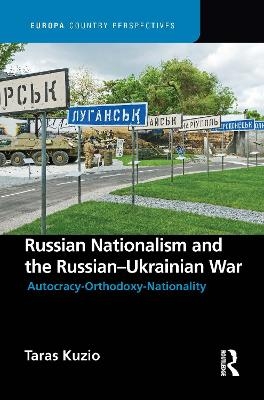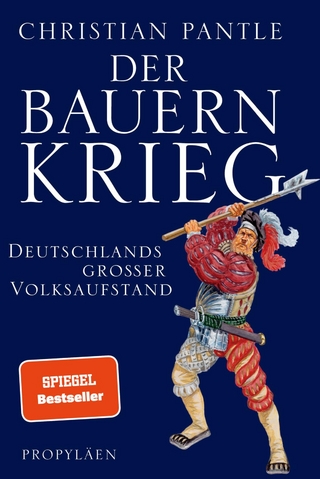
Russian Nationalism and the Russian-Ukrainian War
Seiten
2024
Routledge (Verlag)
978-1-032-04320-3 (ISBN)
Routledge (Verlag)
978-1-032-04320-3 (ISBN)
This groundbreaking volume provides an in-depth understanding of the 2014 crisis, Russia’s annexation of Crimea and Europe’s only war between Russia and Ukraine through analysis of Putin's obsession with Ukraine and why Western sanctions have not deterred Russian military aggression.
This book is the first to provide an in-depth understanding of the 2014 crisis, Russia’s annexation of Crimea and Europe’s de facto war between Russia and Ukraine. The book provides a historical and contemporary understanding behind President Vladimir Putin Russia’s obsession with Ukraine and why Western opprobrium and sanctions have not deterred Russian military aggression.
The volume provides a wealth of detail about the inability of Russia, from the time of the Tsarist Empire, throughout the era of the Union of Soviet Socialist Republics (USSR), and since the dissolution of the latter in 1991, to accept Ukraine as an independent country and Ukrainians as a people distinct and separate from Russians. The book highlights the sources of this lack of acceptance in aspects of Russian national identity. In the Soviet period, Russians principally identified themselves not with the Russian Soviet Federative Republic, but rather with the USSR as a whole. Attempts in the 1990s to forge a post-imperial Russian civic identity grounded in the newly independent Russian Federation were unpopular, and notions of a far larger Russian ‘imagined community’ came to the fore. A post-Soviet integration of Tsarist Russian great power nationalism and White Russian émigré chauvinism had already transformed and hardened Russian denial of the existence of Ukraine and Ukrainians as a people, even prior to the 2014 crises in Crimea and the Donbas. Bringing an end to both the Russian occupation of Crimea and to the broader Russian–Ukrainian conflict can be expected to meet obstacles not only from the Russian de facto President-for-life, Vladimir Putin, but also from how Russia perceives its national identity.
This book is the first to provide an in-depth understanding of the 2014 crisis, Russia’s annexation of Crimea and Europe’s de facto war between Russia and Ukraine. The book provides a historical and contemporary understanding behind President Vladimir Putin Russia’s obsession with Ukraine and why Western opprobrium and sanctions have not deterred Russian military aggression.
The volume provides a wealth of detail about the inability of Russia, from the time of the Tsarist Empire, throughout the era of the Union of Soviet Socialist Republics (USSR), and since the dissolution of the latter in 1991, to accept Ukraine as an independent country and Ukrainians as a people distinct and separate from Russians. The book highlights the sources of this lack of acceptance in aspects of Russian national identity. In the Soviet period, Russians principally identified themselves not with the Russian Soviet Federative Republic, but rather with the USSR as a whole. Attempts in the 1990s to forge a post-imperial Russian civic identity grounded in the newly independent Russian Federation were unpopular, and notions of a far larger Russian ‘imagined community’ came to the fore. A post-Soviet integration of Tsarist Russian great power nationalism and White Russian émigré chauvinism had already transformed and hardened Russian denial of the existence of Ukraine and Ukrainians as a people, even prior to the 2014 crises in Crimea and the Donbas. Bringing an end to both the Russian occupation of Crimea and to the broader Russian–Ukrainian conflict can be expected to meet obstacles not only from the Russian de facto President-for-life, Vladimir Putin, but also from how Russia perceives its national identity.
Preface.
Part I: Theoretical and Comparative Perspectives
Civic, Ethnic, or Civic-Ethnic States: A Discussion of Theoretical Concepts.
Russia and Ukraine in Comparative Perspective.
Part II: Russian Nationalism about Ukraine
Emigres, Dissidents and Soviets.
Boris Yeltsyn: Liberalism, Tanks, and Unions.
Vladimir Putin: ‘Gatherer of Russian Lands.’
Part III: Russian Nationalism versus Ukraine
Democrats and the ‘Red-White-Brown’ Coalition.
Messianism, ‘Holy Rus,’ and the Russian World.
Russia’s ‘Jerusalem’: Crimea, and ‘New Russia’.
Conclusions.
| Erscheinungsdatum | 07.09.2024 |
|---|---|
| Reihe/Serie | Europa Country Perspectives |
| Zusatzinfo | 4 Halftones, black and white; 4 Illustrations, black and white |
| Verlagsort | London |
| Sprache | englisch |
| Maße | 156 x 234 mm |
| Gewicht | 530 g |
| Themenwelt | Geschichte ► Teilgebiete der Geschichte ► Militärgeschichte |
| Sozialwissenschaften ► Politik / Verwaltung ► Politische Systeme | |
| Sozialwissenschaften ► Politik / Verwaltung ► Politische Theorie | |
| ISBN-10 | 1-032-04320-2 / 1032043202 |
| ISBN-13 | 978-1-032-04320-3 / 9781032043203 |
| Zustand | Neuware |
| Informationen gemäß Produktsicherheitsverordnung (GPSR) | |
| Haben Sie eine Frage zum Produkt? |
Mehr entdecken
aus dem Bereich
aus dem Bereich
neueste Manipulationstechniken als Waffengattung der NATO
Buch | Softcover (2023)
Westend (Verlag)
CHF 33,55
Deutschlands großer Volksaufstand
Buch | Softcover (2024)
Propyläen Verlag
CHF 30,80


